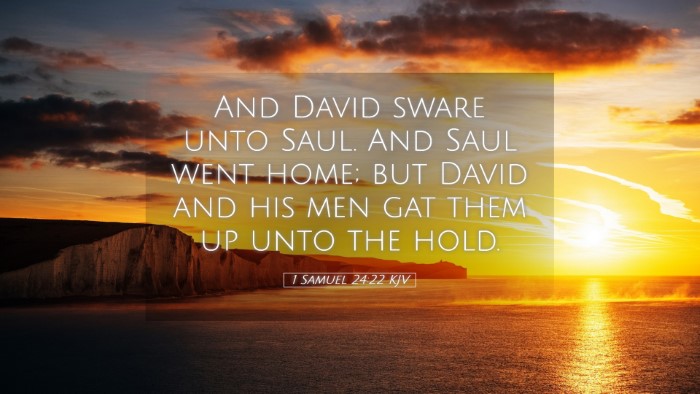Commentary on 1 Samuel 24:22
Verse Context: 1 Samuel 24:22 states: "And David swore unto Saul. And Saul went home; but David and his men gat them up unto the hold."
Introduction
This verse encapsulates a pivotal moment in the relationship between Saul and David. It follows the intense encounter in the cave where David spared Saul's life. The implications of this act resonate throughout the narrative of the Israelite monarchy and provide rich ground for theological reflection.
Historical Background
The backdrop of 1 Samuel 24 is critical for understanding this verse. King Saul, having become increasingly jealous of David's rising popularity, sought to kill him. David's mercy as he spared Saul's life serves as a profound contrast to Saul's vengeful pursuit. This episode demonstrates the tension between divine providence and human agency, as noted by Albert Barnes:
- Barnes highlights that David's decision to spare Saul was not a sign of weakness, but a reflection of his respect for God's anointing on Saul.
- Matthew Henry points out that Saul's acknowledgment of David's right to the throne foreshadows the establishment of David's kingship.
Theological Themes
1. Mercy and Forgiveness: David's act of mercy is pivotal. Adam Clarke emphasizes that David’s spare of Saul showcases the virtue of forgiveness, a theme echoed throughout Scripture.
2. Divine Sovereignty: The events highlight God's sovereignty in the affairs of men. The commentary by Henry notes that David recognized that despite Saul's sinful actions, God's plan would prevail.
3. The Nature of True Leadership: This verse also provides insight into the qualities of true leadership. David's restraint and honor portray a leader after God’s own heart—an essential element for pastors and those in spiritual authority today.
Literary Considerations
The narrative employs a gripping contrast between Saul's royal authority and David's humble circumstances as a fugitive. Barnes comments that the sparing of Saul serves not only as a character development tool for David but also enriches the thematic complexity of the story.
- David’s actions accentuate the tension between good and evil, righteousness and sin, which is a central motif in the Scripture.
- The finality of David’s oath to Saul signifies a critical development in their relationship and the unfolding of God's plans for Israel.
Implications for Ministry and Leadership
This encounter bears significant implications for modern Christian leadership and pastoral practice:
- Ability to Forgive: Leaders are called to show grace even in the face of betrayal or animosity, mirroring David’s response to Saul.
- Respect for God’s Anointed: Just as David honored Saul as the anointed king despite personal threats, current leaders must respect God's chosen servants, acknowledging their roles as part of divine order.
- Dependence on Divine Timing: David’s patience exemplifies the reliance on God’s timing for fulfillment of His promises, a crucial lesson for church leaders.
Applications for Individual Believers
For individual believers, 1 Samuel 24:22 encourages:
- Emulating Forgiveness: Believers are reminded of the call to forgive those who wrong them, reflecting Christ’s mercy.
- Trusting God’s Plan: Like David, individuals are encouraged to trust in God's overarching plan, even amid difficulties.
- Promoting Peace: The act of creating peace, as seen in David’s willingness to reconcile with Saul, is a vital part of the Christian walk.
Conclusion
1 Samuel 24:22 serves as a rich tapestry of mercy, providence, and the journey of leadership under divine authority. The insights gained from public domain commentaries highlight the enduring relevance of this biblical narrative for both scholarly and pastoral contexts. It challenges leaders and believers alike to embody the virtues exemplified by David, to trust in God's timing, and to engage with the complexities of human relationships with grace and honor.


